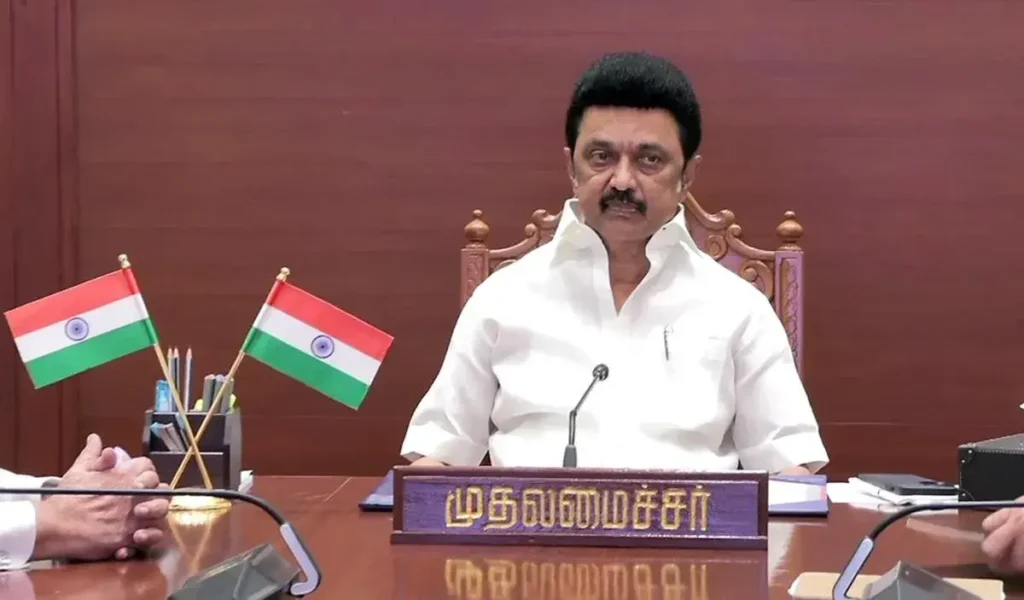A defiant Tamil Nadu has publicly rejected the NEP and through this reiterated its stand, resisting Hindi imposition. Tamil Nadu has once again positioned itself at the forefront of the battle against Hindi imposition. The state’s outright rejection of the National Education Policy (NEP) is not merely a policy disagreement—it is a statement of principled defiance against the Centre’s thinly veiled attempt to impose cultural and linguistic hegemony. The resistance is rooted in Tamil Nadu’s long-standing commitment to linguistic autonomy and the preservation of its cultural identity.
Chief Minister MK Stalin’s fiery response to the NEP, which he claims will push Tamil Nadu ‘backward by 2000 years,’ reflects the deep-rooted resistance within the state against the Union government’s continued disregard for federalism and linguistic diversity. Stalin has further emphasised that the NEP, with its centralised approach, ignores the unique educational needs of each state and is a blatant effort to homogenize education across India.
This is what you call an Opposition! Bravo! @mkstalin https://t.co/am1ZuKwZvt
— Teesta Setalvad (@TeestaSetalvad) February 22, 2025
Tamil Nadu’s long-standing resistance to Hindi imposition
Tamil Nadu’s resistance to Hindi imposition is deeply entrenched in its socio-political fabric. The anti-Hindi movement in the state has a long and vibrant history, beginning as early as 1937, when the C. Rajagopalachari-led Congress government in the Madras Presidency attempted to introduce Hindi in schools. This triggered a massive outcry, leading to widespread protests by students, teachers, and political leaders who saw this as an attempt to undermine Tamil language and culture
The language protests reached a boiling point in 1965 when the Indian government attempted to replace English with Hindi as the sole official language of the country. Students, intellectuals, and political leaders took to the streets, culminating in violent protests that ultimately forced the Centre to relent and retain English as an associate official language alongside Hindi. These events cemented Tamil Nadu’s defiant stance against linguistic imperialism.
Nehru’s 1959 promise and the betrayal
In the wake of these protests, Prime Minister Jawaharlal Nehru, in 1959, assured the people of Tamil Nadu that English would continue as an official language for as long as non-Hindi speaking states wanted it. However, successive governments have tried to renege on this promise, subtly pushing Hindi through policies like NEP. The so-called three-language formula is nothing but a tool to coerce non-Hindi speakers into learning Hindi while Hindi-speaking states face no such compulsion to learn southern languages.
A flawed model: Hindi-speaking states lagging in education
The Centre’s argument that Hindi is necessary for national integration crumbles under scrutiny. Hindi-speaking states consistently perform poorly in education, employment, and economic indicators. Uttar Pradesh, Bihar, and Madhya Pradesh, the heartlands of Hindi, have some of the lowest literacy rates in the country, proving that Hindi is not a magic wand for progress. If anything, Tamil Nadu, which has refused to embrace Hindi, has done far better in education, employment, and social development.
The NEP and its assault on federalism
The NEP is not just about education; it is a direct attack on the federal structure of the Constitution. Education, which was originally in the State List, was forcibly moved to the Concurrent List in 1976, taking away states’ autonomy over a crucial subject. The NEP exacerbates this by allowing the Centre to dictate syllabi, control educational institutions, and impose a uniform framework that disregards regional languages and cultures. The Tamil Nadu government’s demand to restore education to the State List is, therefore, not just about resisting Hindi but about reclaiming constitutional federalism.
Succinct. Articulate. Objections to Bill both national and a federal, serious federal concern. This unikn govt is a hatchet regime rejecting the tenets of the Indian Constitution! @mkstalin https://t.co/2tyC8P3bU7
— Teesta Setalvad (@TeestaSetalvad) February 23, 2025
Mohan Bhagwat’s questionable advice to ‘ditch English’
Amid this policy battle, Rashtriya Swayamsevak Sangh (RSS) chief Mohan Bhagwat has added fuel to the fire by advising Hindus to stop speaking English and embrace Indian languages instead. Ironically the RSS that claims itself to be a merely ‘cultural outfit’ is not simply the backbone of the three times elected Modi regime, but often wades in everything that is political.
Withholding funds: The centre’s strong-arm tactics
Tamil Nadu’s refusal to implement the NEP has led to the Union withholding Rs 2,150 crore in education funds, a clear act of coercion. This financial strangulation tactic is reminiscent of colonial-era policies where dissenting states were punished. The Union’s message is clear: ‘Implement our policies or face financial retribution.’ But Tamil Nadu is not one to bow down and its chief minister M.K. Stalin in fact said he is not ready to accept NEP even if centre offered Rs. 10,000 crores.
Tamil Nadu’s resistance to the NEP and Hindi imposition is not just about language—it is about protecting the rights of states, preserving linguistic diversity, and upholding the federal structure of India. The state has historically been at the forefront of social justice movements, and its current stand against NEP is another chapter in its fight against central overreach.
The Union must realise that a one-size-fits-all policy will never work in a country as diverse as India. Until then, Tamil Nadu will continue to resist, unyielding and unapologetic.
Related

